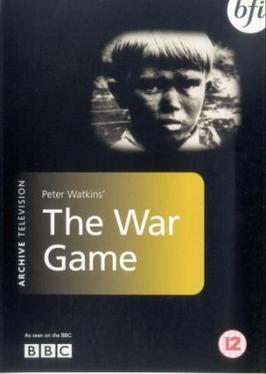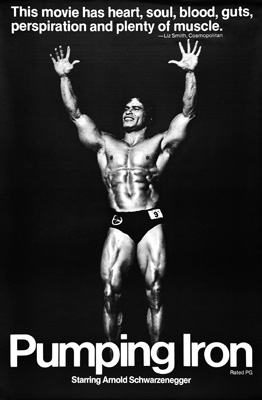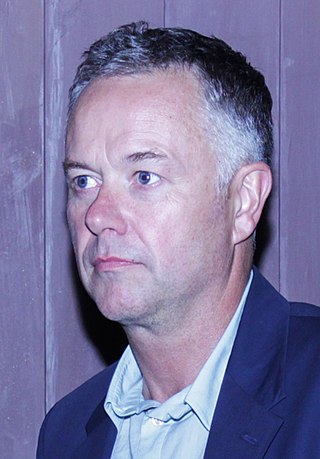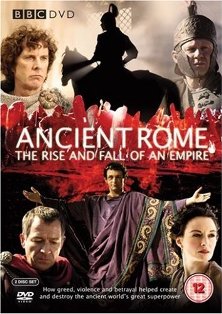Related Research Articles

The War Game is a 1966 British pseudo-documentary film that depicts a nuclear war and its aftermath. Written, directed and produced by Peter Watkins for the BBC, it caused dismay within the BBC and within government, and was withdrawn before the provisional screening date of 6 October 1965. The corporation said that "the effect of the film has been judged by the BBC to be too horrifying for the medium of broadcasting. It will, however, be shown to invited audiences..."
A mockumentary is a type of film or television show depicting fictional events, but presented as a documentary. The term originated in the 1960s but was popularized in the mid-1990s when This Is Spinal Tap director Rob Reiner used it in interviews to describe that film.

Pumping Iron is a 1977 American docudrama about the world of professional bodybuilding, with a focus on the 1975 IFBB Mr. Universe and 1975 Mr. Olympia competitions. Directed by George Butler and Robert Fiore and edited by Geof Bartz and Larry Silk, it is inspired by the 1974 book of the same name by photographer Butler and writer Charles Gaines and nominally centers on the competition between Arnold Schwarzenegger and one of his primary competitors for the title of Mr. Olympia, Lou Ferrigno. The film also features segments on bodybuilders Franco Columbu and Mike Katz, in addition to appearances by Ken Waller, Ed Corney, Serge Nubret, and other famous bodybuilders of the era.

Bowling for Columbine is a 2002 documentary film written, produced, directed, and narrated by Michael Moore. The film explores what Moore suggests are the primary causes for the Columbine High School massacre and other acts of gun violence. He focuses on the background and environment in which the massacre took place and some common public opinions and assumptions about related issues. The film also looks into the nature of violence in the United States, and American violence abroad.
Docudrama is a genre of television and film, which features dramatized re-enactments of actual events. It is described as a hybrid of documentary and drama and "a fact-based representation of real event".

The 1972 Yugoslav smallpox outbreak was the largest outbreak of smallpox in Europe after the Second World War. It was centered in SAP Kosovo, a province of Serbia within Yugoslavia, and the capital city of Belgrade. A Kosovar Albanian Muslim pilgrim had contracted the smallpox virus in the Middle East. Upon returning to his home in Kosovo, he started the epidemic in which 175 people were infected, killing 35. The epidemic was efficiently contained by enforced quarantine and mass vaccination. The 1982 film Variola Vera is based on the event.

Michael Winterbottom is an English film director. He began his career working in British television before moving into features. Three of his films—Welcome to Sarajevo, Wonderland and 24 Hour Party People—have competed for the Palme d'Or at the Cannes Film Festival. He and co-director Mat Whitecross won the Silver Bear for Best Director at the 56th Berlin International Film Festival for their work on The Road to Guantanamo.
A semidocumentary is a form of book, film, or television program presenting a fictional story that incorporates many factual details or actual events, or which is presented in a manner similar to a documentary.
Jane Fairbairn Root is a creative executive in the media industry, who has run major television networks on both sides of the Atlantic. As Controller of BBC Two, she was the first woman to be a channel controller for the BBC, and was later President of Discovery Networks in the United States.

Ancient Rome: The Rise and Fall of an Empire is a 2006 BBC One docudrama series, with each episode looking at a different key turning point in the history of the Roman Republic and Empire. This docudrama focuses on the Latin western half of the Roman Empire.

Docufiction is the cinematographic combination of documentary and fiction, this term often meaning narrative film. It is a film genre which attempts to capture reality such as it is and which simultaneously introduces unreal elements or fictional situations in narrative in order to strengthen the representation of reality using some kind of artistic expression.
Dominic Streatfeild is an author, freelance journalist and documentary maker based in the UK who specialises in military and security issues.
Adam Wishart is a documentary filmmaker. His professional background includes writing, directing, and appearing in various productions for BBC television projects.

"Sardines" is the first episode of the first series of the British black comedy anthology series Inside No. 9. Written by Steve Pemberton and Reece Shearsmith, it premiered on BBC Two and BBC Two HD on 5 February 2014. In the episode, a group of adults play sardines at an engagement party. Rebecca, the bride-to-be, finds a boring man named Ian in a wardrobe; he introduces himself as a colleague of Jeremy, Rebecca's fiancé. The pair are subsequently joined by family, friends and colleagues of Rebecca and Jeremy. As more people enter the room and step into the wardrobe, secrets shared by some of the characters are revealed, with various allusions to incestuous relationships, child sexual abuse, and adultery. The humour is both dark and British, with references to past unhappiness and polite but awkward interactions.

"A Quiet Night In" is the second episode of the British dark comedy television anthology series Inside No. 9. It first aired on 12 February 2014 on BBC Two. Written by Reece Shearsmith and Steve Pemberton, it stars the writers as a pair of hapless burglars attempting to break into the large, modernist house of a couple—played by Denis Lawson and Oona Chaplin—to steal a painting. Once the burglars make it into the house, they encounter obstacle after obstacle, while the lovers, unaware of the burglars' presence, argue. The episode progresses almost entirely without dialogue, relying instead on physical comedy and slapstick, though more sinister elements are present in the plot. In addition to Pemberton, Shearsmith, Lawson and Chaplin, "A Quiet Night In" also starred Joyce Veheary and Kayvan Novak.

Banished is a British drama television serial created by Jimmy McGovern. The seven-part serial first aired on 5 March 2015 on BBC Two and was inspired by events in the eighteenth century when Britain established a penal colony in Australia.

Kim Danila Shillinglaw is a British media executive and non-executive director. A former controller of BBC Two and BBC Four, head of science and natural history commissioning at the BBC, and commissioner for children's entertainment at CBBC, she later became director of factual businesses at Endemol Shine. She is known for having transformed popular science on television.

UKIP: The First 100 Days is a 2015 mockumentary which was broadcast on Channel 4 in the United Kingdom on 16 February 2015, a few months before the May 2015 general election. It tells the fictional story of how the country would be run if the UK Independence Party (UKIP), a Eurosceptic party, were to win the election and leader Nigel Farage becoming Prime Minister. The programme is filmed in the style of a fly-on-the-wall documentary that follows UKIP's fictional first female Asian MP as she struggles with the party's stance on immigration amid mounting public discontent with its hardline policies. The role of Deepa Kaur, who is elected to serve as MP for the Romford constituency, is played by Priyanga Burford.

Meet the Ukippers is a British documentary that first aired on BBC Two on 22 February 2015. The film follows the activities of the UK Independence Party (UKIP) in South Thanet, a constituency in South East England which had selected party leader Nigel Farage to contest the 2015 general election. Tracking the party's fortunes over a period of six months, the programme focused primarily on the activists who hoped to get Farage elected as an MP. While some attempted to explain UKIP's message, others were seen to express controversial opinions about race and immigration. Prior to its broadcast, some of the film's content led to one UKIP councillor being expelled from the party after she referred to black people as "negros". The film received generally positive reviews, with favourable comparisons drawn with a docudrama aired the previous week that had offered a fictitious account of Britain's first UKIP government. Meet the Ukippers attracted an audience of 1.42 million, giving BBC Two their best ratings for a factual programme broadcast in the 10.00pm Sunday evening slot since 2012.
Vanessa Engle is a British documentary filmmaker. After spending four years working for BBC2's late night arts magazine programme, The Late Show, she began to make her own documentaries. She is known for Lefties (2006) and the Arena film The $50 Million Art Swindle (2019).
References
- ↑ Smallpox 2002 – Silent Weapon round up of newspaper reviews, in The Guardian, 6 February 2002
- ↑ Smallpox proves infectious for BBC2, The Guardian, 6 February 2002